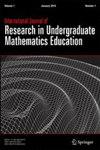大学预科数学教学模式及其与职前教师年龄的关系
IF 1.2
Q2 EDUCATION & EDUCATIONAL RESEARCH
International Journal of Research in Undergraduate Mathematics Education
Pub Date : 2022-10-24
DOI:10.17583/redimat.10400
引用次数: 0
摘要
本文基于马德里开放大学(UDIMA)中学、学士学位、FP教师培训硕士学位和小学教育教师学位的225名学生的教学过程,探讨了大学前阶段接受的数学教育。为了收集所需的信息,使用了由本研究作者设计并经马德里开放大学(UDIMA)伦理委员会验证的计算机化问卷。本研究的结果揭示了职前教师在小学和中学阶段对数学的记忆。与其他主动教学模式相比,以重复计算过程为基础的传统教学模式占多数。可以观察到,为解决复杂问题提供支持的方法逐步增加,发现西班牙2006年立法变化的影响不大。在开发新的基于能力的立法方法时,对经典教学模式的掌握和围绕大学预科教育中发现的复杂问题的适度工作可能是主要制约因素。本文章由计算机程序翻译,如有差异,请以英文原文为准。
Teaching models in preuniversity Mathematics and their relation with preservice teachers ages
This paper addresses the mathematical education received during the pre-university stage based on the teaching-learning processes experienced by 225 students from the master’s degree in Teacher Training of Secondary, Baccalaureate, and FP and the Degree of Teacher of Primary Education of the Madrid Open University (UDIMA). For collecting the required information, a computerized questionnaire designed by the authors of this work and validated by the Ethics Committee of the Madrid Open University (UDIMA), has been used. The results of our study reveal the preservice teachers' memories about mathematics during the Primary and Secondary stages. Traditional teaching models, based on the repetition of calculation procedures, are the majority compared to other active teaching models. It is observed that a progressive increase in the methodologies supported by solving complex problems, detecting a moderate influence of the legislative changes produced in Spain in 2006. The mastery of classical teaching models and the moderate work around complex problems detected in pre-university education can be major constraints when developing new competency-based legislative approaches.
求助全文
通过发布文献求助,成功后即可免费获取论文全文。
去求助
来源期刊

International Journal of Research in Undergraduate Mathematics Education
EDUCATION & EDUCATIONAL RESEARCH-
CiteScore
2.90
自引率
20.00%
发文量
41
期刊介绍:
The International Journal of Research in Undergraduate Mathematics Education is dedicated to the interests of post secondary mathematics learning and teaching. It welcomes original research, including empirical, theoretical, and methodological reports of learning and teaching of undergraduate and graduate students.The journal contains insights on mathematics education from introductory courses such as calculus to higher level courses such as linear algebra, all the way through advanced courses in analysis and abstract algebra. It is also a venue for research that focuses on graduate level mathematics teaching and learning as well as research that examines how mathematicians go about their professional practice. In addition, the journal is an outlet for the publication of mathematics education research conducted in other tertiary settings, such as technical and community colleges. It provides the intellectual foundation for improving university mathematics teaching and learning and it will address specific problems in the secondary-tertiary transition. The journal contains original research reports in post-secondary mathematics. Empirical reports must be theoretically and methodologically rigorous. Manuscripts describing theoretical and methodological advances are also welcome.
 求助内容:
求助内容: 应助结果提醒方式:
应助结果提醒方式:


